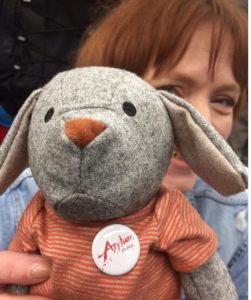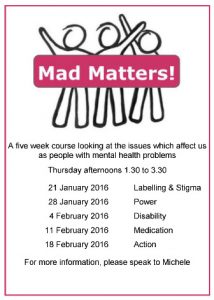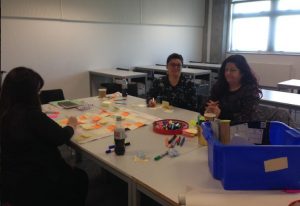We were all absolutely delighted to be invited to present at Asylum’s Action and Reaction conference this year. And when we heard Bob Dylan was in town we knew we had to attend.

We are members of CAPS Independent Advocacy, and have all completed the Mad People’s History and Identity (MPHI) course at Queen Margaret University, Edinburgh. Now we are involved in evaluating the course by using participatory action research (PAR). We identify as survivors, activists, mad people.
The course came from Oor Mad History, a community history project about the service user movement in the Lothians, which was facilitated by CAPS. The people involved were inspired by the Mad People’s History course taught by David Reville at Ryerson University, Toronto. After a lot of time and a few false starts, we finally met Elaine Ballantyne, a lecturer at QMU, who identifies as Mad Positive. The course was funded initially by NHS Lothian and ran from 2014-2016. Most of the lecturers and all the students had experience of mental distress and using services. Some students went on to develop and deliver a five-session community course which we called Mad Matters.

Mad People’s History & Identity was short-listed for the Glasgow Herald Higher Education awards, 2016
Why research MPHI?
We were initially funded for three years by NHS Lothian, which enabled us to successfully run the university course from 2014-2016. It was agreed to take a year out to review our achievement and secure further funding to develop Mad Studies, both in the university and beyond.
Feedback from students included “Made me feel not alone”, “Gave me answers to questions I’d never had before”, and “Helped me connect with my anger”.
There was a general feeling of a sense of community, with some people stating the course had changed their lives! We wanted to better understand the motivations, experiences and impact of being involved in Mad Studies on mad-identified students. A MPHI course lecturer, who identifies as Mad + and as an ally of mad-identified people, and who had also been part of the original steering group, invited all the QMU students to work on a participatory action research proposal with her so as to explore the experiences and impacts of the course on students. The lecturer is also using the PAR research for her PhD.
It was important to us for the research to be in keeping with the course by developing people’s skills and building on a newfound sense of community. We wanted to break down the gap between researchers and those being researched, just as the course aimed to blur the lines between lecturers and students, and we thought it vital to bring the message of the course to people in other parts of the university.

The research Group comprised a QMU Lecturer, a CAPS Oor Mad History worker, a Mad-identified postgraduate research student, and four Mad-identified students. They began to meet regularly in the Spring of 2016. The student members of the group were invited to attend a two-day training course for community-based PAR at the Durham University Centre for Social Justice and Community Action. This was to ensure the survivor members of the research group have the knowledge and skills to take a leading role in the development and delivery of the research project.
What is PAR?
Participatory:
- Collaboration through participation
- Empowerment of participants
Action:
- Change – real life experiences
- Evidence, in terms of different outcomes
Research:
- New knowledge
- Documented learning
Research aims were agreed as:
- To understand the motivations, experiences and impacts of being involved in a mad studies project on mad-identified students.
- To develop a deeper understanding of mad studies as a critical pedagogy, and its contribution to promoting mad identity, generating mad knowledge and facilitating mad activism from mad studies student perspectives.
- To ascertain the contribution of PAR to understanding the connections between engaging in mad studies, mad activism and emancipation, from mad studies student perspectives.
Research questions as developed by the PAR group were:
- What motivates mad-identified people to be part of a mad studies course?
- What narratives do mad-identified students construct around their own mad history and mad identity?
- What are the experiences and impacts on mad-identified students of being part of a mad studies course?
- What can Participatory Action Research contribute to understanding the relationship between the engagement in a mad studies project, activism and the facilitation of emancipation?
Research methods:
An analysis of documentary evidence already available would inform further data collection and student anonymised application forms which included questions about their motivation and reasons for applying for the course, as well as details of previous experiences. Student (survivor) members of the research group would both take part in interviews about their own experiences as course graduates and interview other students. Interviews were filmed and completed using a semi-structured interview schedule.
The research group met together to work on the analysis of the interview material and to develop a framework of key themes before inviting interviewees back to the university to review the film of their interview and to comment on our analytical framework, so as to ensure it coincided with their own experiences and understanding. It was hoped the fieldwork and analysis stage and other outcomes of the PAR would be completed by October 2017.
As part of the QMU course, students were asked to bring a photo which expressed their experiences of madness, which also incorporated that week’s topic. They were invited to write an optional photovoice assignment of a thousand words describing their experiences of madness, which earned 20 credits. The research group organised an exhibition of some of these images and narratives which took place at the University during March 2017. A short film is being made to help raise awareness and disseminate information and outcomes from the research.
Students’ Photovoice Assignment at Exhibition
Penny’s story
Dialectical Behavioural Therapy: Effective treatment for BPD or a “Stepford Wives therapy” Programme? (aka, the Anti-Psychiatry Movement: Irrational Hostility or Common Sense).
The image I have chosen to write my ‘photovoice’ assessment around is one from the 1970’s film The Stepford Wives. This is a Hollywood movie about how the wives in the community of Stepford, during the heyday of feminism, were eerily transformed into ultra-compliant, twee, very feminine, ‘wouldn’t say boo to a goose’ robots. This was because their husbands were fed up with their wives being influenced by feminism and no longer wanting to be the pretty little wife at home to wait on them hand and foot, have their tea on the table and waiting for them in bed wearing a sexy negligée.

This is the image that came to mind when I first read Marsha Linehan’s Skills Training Manual, in which she first described how to deliver dialectical behaviour therapy (DBT). In the UK, DBT is now the most widely offered type of talking therapy for people diagnosed with borderline personality disorder (BPD).
Shirley’s story
In 2013, I was referred to the Barony Project in Edinburgh, where I was told about MPHI. I was delighted when I successfully applied for the 2015 course. My credentials were my own lived experiences of mental distress. I was also grieving for my son whom I lost in 2012.

The course gave me great purpose not only for myself but also in my sons’ memory. I have attended conferences in Durham, Cork and Manchester. I have also been involved in several projects including: Conversations for Change, Stories of Changing Lives at a local psychiatric hospital, and helping organise and facilitate a Mad Studies community course.
All of this has been very valuable and has inspired me to help others and continue with mental health activism. I feel more knowledgeable and resourceful in moving forwards.
Presentation done and dusted (phew) we had time for questions and comments.
Some people said they wouldn’t use the word ‘mad’ to self-identify, which is something that came up regularly amongst students on our course. We also discussed replacing Recovery college courses with Mad Studies community courses, thereby replacing a neoliberalist approach with a collective lived experience one.
Several people asked why they had never heard of Mad Studies, which we have taken on board and were discussing just recently. We hope soon to be able to look at ways of publicising what we do. We already have a community course template which has been successful in Edinburgh, and we are happy to pass it on as shared knowledge.
Funding was discussed, and we explained how in Scotland mental health advocacy is a legal right and hence more likely to be funded. We are also fortunate in the Lothians to have an excellent relationship with the NHS purse-holder.
It’s still early days for the outcomes of the PAR research. However, one major and exciting outcome is we have now been given five years more funding from NHS Lothian!
Thank you, Asylum magazine, for inviting us to take part at your Action and Reaction conference. We had a ball and hope to catch up again with you all soon.
